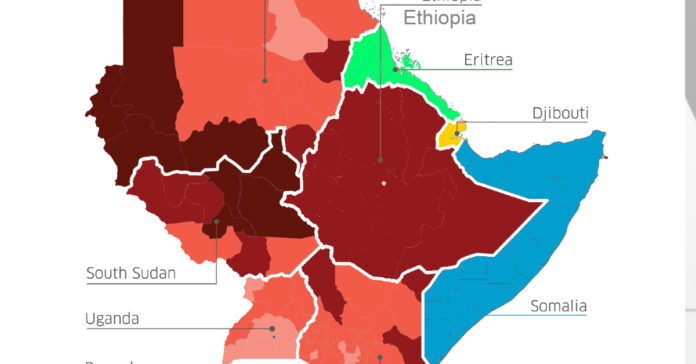In recent months, Ethiopia’s leadership has escalated its rhetoric regarding access to a seaport—framing the issue not merely as a matter of trade or development, but as a strategic entitlement. In a widely viewed televised interview, Prime Minister Abiy Ahmed expressed “regret” over what he described as Ethiopia’s “loss” of access to the sea. This narrative, now embedded in the government’s messaging, is not only misleading—it is perilous. It distorts historical facts, disregards international law, and risks undermining stability in the already volatile Horn of Africa.
A Manufactured Narrative
Ethiopia has never legally possessed a seaport. Its only direct access to the Red Sea occurred between 1952 and 1962, during a United Nations-brokered federation with Eritrea. That arrangement—established by UN General Assembly Resolution 390 A(V) in December 1950—was intended to respect Eritrea’s internal autonomy while granting Ethiopia access to the coast for maritime trade. However, in 1962, Emperor Haile Selassie unilaterally dissolved the federation and annexed Eritrea—an act widely condemned as a violation of international law.
This illegal annexation triggered a thirty-year war for independence, culminating in Eritrea’s liberation in 1991. In 1993, following a UN-supervised referendum, 99.8% of Eritreans voted in favour of independence. Eritrea officially declared its independence on 24 May 1993 and was subsequently recognised by the international community—including Ethiopia.
Ethiopia also acknowledged Eritrea’s sovereignty and coastline, as defined in colonial treaties:
The Treaty of 1900, which demarcated the western boundary,
The Treaty of 1902, which defined the central border sector, and
The Treaty of 1908, which addressed the eastern sector, including key ports.
These borders were further reaffirmed by the Eritrea–Ethiopia Boundary Commission (EEBC) ruling on 13 April 2002, issued as part of the Algiers Peace Agreement signed in December 2000. Both parties agreed to accept the ruling as “final and binding.”
To portray Eritrea’s independence as a “loss” of Ethiopian territory is not only factually inaccurate—it constitutes a direct challenge to internationally recognised and legally affirmed borders.
Legal Boundaries Are Not Up for Renegotiation
Eritrea is a sovereign state—internationally recognised and legally defined. Its borders are not ambiguous under international law. Both the UN Charter and the Constitutive Act of the African Union uphold the inviolability of territorial integrity—principles specifically designed to prevent post-colonial Africa from descending into endless territorial disputes.
Today, Ethiopia conducts the majority of its international trade via the Port of Djibouti. Other coastal neighbours, such as Sudan and Kenya, have expressed a willingness to enhance regional cooperation. If Ethiopia seeks broader access to seaborne trade, legitimate diplomatic avenues are available. What is not acceptable is the assertion that strategic necessity or historic sentiment entitles one state to the sovereign territory of another.
Strategic Ambiguity or Escalatory Intent?
Although Prime Minister Abiy Ahmed has repeatedly claimed that Ethiopia seeks seaport access through “peaceful and legal means,” no concrete legal proposals or multilateral initiatives have been made public. Instead, Ethiopian officials and state media have leaned heavily on vague allusions to “historical injustice” and “strategic need”—rhetoric that heightens fears of potential coercion.
Such ambiguity fuels mistrust across the region. The notion that a landlocked state might have a “right” to another country’s coastline—by virtue of proximity, size, or history—is deeply troubling. If this principle were to be normalised, it could have grave implications for many African borders, most of which are rooted in colonial-era treaties.
The Danger of Silence
Equally concerning is the international community’s relative silence. Ethiopia is often viewed as a key Western partner—particularly in areas such as counterterrorism, migration control, and peacekeeping. However, geopolitical interests should not override foundational principles of international law.
Allowing a stronger state to use its influence—economic, diplomatic, or military—to pressure a smaller neighbour into territorial concessions would set a dangerous precedent. It would embolden similar behaviour elsewhere and erode trust in the very legal frameworks that underpin the post-colonial international order.
A Precedent That Must Be Rejected
Eritrea’s independence is not a matter of convenience or diplomatic favour—it is the result of a determined liberation struggle, an internationally supervised referendum, and clear legal recognition. Its borders are defined by treaty and arbitration and are not subject to revision based on the changing geopolitical aspirations of its neighbour.
Ethiopia, like any other nation, is entitled to seek improved access to global markets. But this must be pursued within the limits of international law and through mutual consent—not through revisionist narratives or veiled threats.
Conclusion
The Horn of Africa is a region still grappling with the consequences of war, displacement, and underdevelopment. Introducing a new territorial dispute—based on misrepresented history and ambiguous rhetoric—would be reckless and potentially catastrophic.
The international community, along with responsible actors in the region, must draw a firm line. Sovereignty, peace, and the rule of law are not negotiable. Eritrea’s ports are not Ethiopia’s to reclaim, and any attempt to suggest otherwise threatens to plunge the region into another unnecessary crisis.

